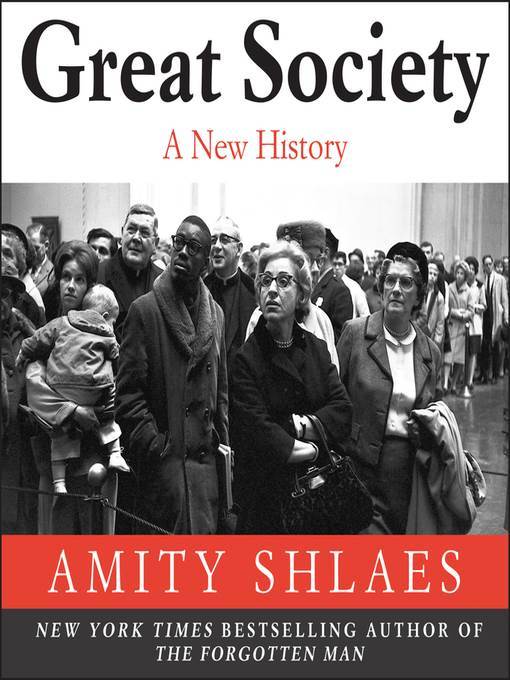
Great Society
A New History
کتاب های مرتبط
- اطلاعات
- نقد و بررسی
- دیدگاه کاربران
نقد و بررسی

Shlaes (Coolidge, 2013, etc.) offers a decidedly revisionist history of the 1960s in the United States. "The New Deal created a forgotten man," writes the author, chair of the board of the Calvin Coolidge Presidential Foundation. "The Great Society created more." In a follow-up to her The Forgotten Man: A New History of the Great Depression (2007), Shlaes writes that Lyndon Johnson's Great Society reforms "seemed designed to finish the job" of Franklin Roosevelt's New Deal government expansion and had similarly disastrous results. The 1960s reforms--community action, housing, and other programs--came "close enough to socialism to cause economic tragedy." While action in the public sector spurred advances in civil rights and health care, Great Society economic programs, including the "lost" War on Poverty, encouraged "a new sense of hopelessness" in welfare recipients, stifled private sector innovation, and led to inflation and unemployment in the '70s. Moreover, argues the author, "Great Society collectivism" resulted in enormous entitlement costs that make it difficult to address today's pressing problems. She cautions against the present flirtation with "broad, vague, and romantic" socialism and champions free-market capitalism and an end to federal intrusions in local government. Her vividly detailed narrative brings to life the social, political, and economic issues of the period. Shlaes emphasizes the little-recognized, outsized role played in public policymaking by socialist labor leader Walter Reuther, a supporter of the radical group that spawned Students for a Democratic Society, led by "professional protester" Tom Hayden, whose 1962 Port Huron Statement helped inspire Johnson's Great Society. Together with democratic socialist Michael Harrington, Reuther hoped Johnson would "complete" Roosevelt's revolution. The author chronicles at length federal "arrogance" in dealing with mayors to implement community efforts. Her disdain for liberal reformers and intellectuals will trouble some readers, as will her insistence that private enterprise, with its efficiency and measures-of-success approach, would have succeeded where public action failed in the face of social and political chaos. A provocative, well-argued take on a turbulent era.
COPYRIGHT(2019) Kirkus Reviews, ALL RIGHTS RESERVED. (Online Review)

December 23, 2019
Former Financial Times columnist Shlaes (The Forgotten Man) contends, in this dense yet fluidly written account, that U.S. government efforts to eradicate poverty, increase worker protections, expand medical coverage, and establish environmental regulations during the Kennedy, Johnson, and Nixon administrations led to “economic tragedy.” According to Shlaes, federal entitlement programs instituted or expanded during the 1960s failed to win the War on Poverty and established “a permanent sense of downtroddenness” among the poor. She credits Job Corps founder Sargent Shriver and Housing and Urban Development secretary George Romney with attempting to remedy youth unemployment and housing segregation, respectively, but claims that the private sector and local initiatives were more effective in those and other goals. Shlaes praises business executives, governors, and mayors for pushing back against “the incursions of the federal government,” and blames union bosses for winning so many employee benefits that U.S. companies could no longer compete with foreign rivals. While Shlaes mainly succeeds in keeping the narrative from bogging down in the nitty-gritty of policy making, her ideological slant leads to some questionable interpretations, as when she claims, “ was an indictment of executive overreach generally.” The result is more of a backwards-looking polemic against democratic socialism than an essential history of the Great Society era. Agent: Sarah Chalfant, the Wylie Agency.

Terence Aselford brings an announcer's voice to this work as he peppers listeners with the statistics and anecdotes in its opening summary. Shlaes takes a skeptical view of the Lyndon Johnson's "Great Society," which expanded government in the 1960s. She cites problems such as the urban housing projects that turned to space-age materials to curb vandalism as factory jobs left cities and poverty increased, provoking criticism from many, including author James Baldwin. As she does, she traces the evolution of Ronald Reagan from GE spokesman to political figure. She uses tallies of guns, butter, and the Dow to track economic effects. Aselford can bog down when talking about dry topics such as legal challenges or Federal Reserve maneuvers, but he generally keeps this detailed history of a decade of change interesting. J.A.S. � AudioFile 2019, Portland, Maine

December 6, 2019
In this meticulously researched and detailed U.S. economic history of the turbulent years of 1960-71, Shlaes (Calvin Coolidge Presidential Fnd.) argues that well-meaning but faulty social programs of the Great Society are the seeds of our present-day financial and monetary turmoil. The author describes how under the presidential administrations of John F. Kennedy, Lyndon B. Johnson, and Richard Nixon grew massive government-funded social programs in the areas of health care, housing, and transportation. These policies transformed the lives of every American, in one way or another, says Shlaes, and for many, the development of government intervention into the daily lives of citizens was (and still is) despised as pure socialism. Throughout, Shlaes subtly endorses capitalism as the remedy, and though some readers may be receptive to her interpretation of these historical events, political figures, and policies of the period, others will disagree. VERDICT While far from a polemical text, Shlaes's work raises a point of view that represents a specific spectrum of economic ideology; for readers who share the author's beliefs.--Linda Frederiksen, formerly with Washington State Univ. Lib., Vancouver
Copyright 2019 Library Journal, LLC Used with permission.

























دیدگاه کاربران